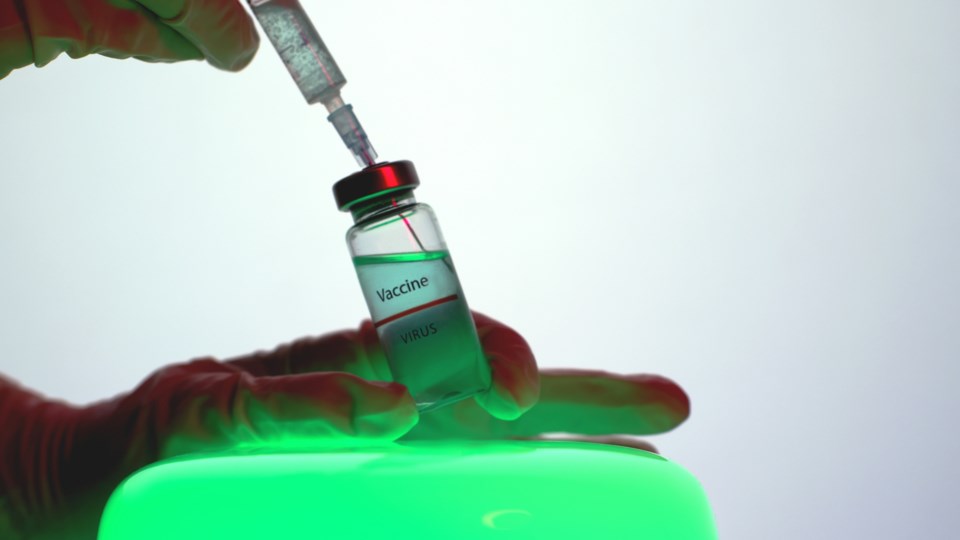As the variants of concern overwhelm the total number of COVID-19 cases, particularly in the Simcoe-Muskoka area, there has been concern about the effectiveness of the different vaccines on the new variants.
Just the same, doctors say the vaccine that is offered is the best one to get.
“All four of the vaccines that have been approved in Canada have amazing efficacy rates against the things that matter — hospitalizations, death, ventilation, heart-lung machine,” said Dr. Samantha Hill, president of the Ontario Medical Association (OMA).
Hill said it’s amazing that today’s science has been able to respond so quickly to the pandemic.
Dr. Zain Chagla, infectious diseases physician at St. Joseph’s Healthcare in Hamilton and chair of the OMA section on infectious diseases, said the vaccines currently approved and in use in Canada do largely protect people against COVID-19 and the variants.
But he sees the possibility for the addition of a booster to address the changes and the variants.
“There is going to be a need, probably, for some degree of boosters, particularly with these mutations in mind,” he said during a media briefing on Tuesday.
Dr. Vinita Dubey, Toronto Public Health's associate medical officer of health, added a booster may be unnecessary if there’s herd immunity, although it does remain a possibility.
But, she added, better a shot than none at all, even for mutations of the virus.
“Even if the current vaccine doesn’t provide the exact protection for which it was intended, there’s often cross protection and we see that with the flu vaccine, too,” she said. “Even if the current virus continues to change, it will provide a level of protection more than without being vaccinated.”
Despite the challenges, Hill sees brighter days ahead. The promising warmer weather and longer days means we’ll soon be spending more time outdoors, which is safer than being indoors when it comes to COVID-19.
And despite the challenges, most people have largely adopted the suggested protective measures.
“The most impressive thing that’s come out of this has been seeing how Ontarians have rallied, repeatedly, despite all of the challenges,” she said. “We really are coming into better times. We have the vaccines, it’s just a question of getting them into arms.”
The immediate challenge is to slow down the spread to buy enough time to get everyone vaccinated, which may come as soon as the summer.
“What a miracle of not just one but four effective and approved vaccines in Canada is,” said Hill. “It’s really watching what science can do in a really concrete fashion”
COVID-19 VARIANTS AT A GLANCE
According to Public Health Ontario, the variants of concern have been associated with increased transmissibility, severity, and/or possible immune evasion with potential implications for reinfection and vaccine effectiveness.
B.1.1.7 linked to the UK
The B.1.1.7 variant was first detected in Britain in September and spread rapidly through the UK accounting for three-quarters of all infections there by the end of the year. It quickly spread to other countries, appearing in Canada in the new year.
It emerged in a significant way at Barrie’s Roberta Place long-term care facility, where 72 people have died of COVID-19, leading the local medical officer of health to declare Barrie "ground zero" for the variant. The latest death at the Barrie home, a woman older than 80, was reported by the health unit on Tuesday.
The B.1.1.7 strain represents the highest number of infections caused by a variant locally with 252 cases of the 851 total variants of concern identified in Simcoe-Muskoka as of Wednesday.
According to Public Health Ontario, B.1.1.7 appears to have higher transmissibility as well as a higher risk of hospitalization and death. But there is no clear evidence of a higher risk of re-infection with B.1.1.7. It reports that impact on vaccine effectiveness seems unlikely based on phase clinical trials and laboratory data.
B.1.351 linked to South Africa
The (501Y.V2) variant has been recently detected in Simcoe-Muskoka. As of Wednesday, one case of the B.1.351 strain has been confirmed in this area.
B.1.351 emerged in South Africa’s Nelson Mandela Bay in early October 2020 and by the end of November 2020 became the dominant virus lineage in the Eastern and Western Cape provinces and then spread throughout South Africa and to over 40 countries worldwide, including Canada.
According to Public Health Ontario, it is more transmissible compared to lineages circulating during the first wave of the pandemic, although its impact on severity was not clear early on. There was also concern about the possibility of increased risk of reinfection by B.1.351.
P.1 linked to Brazil
The P.1 lineage was first reported in Japan and later identified in Brazil in December, making its way to other countries and identified in Ontario in February. As of Wednesday, seven cases of the P.1 variant have been confirmed in Simcoe-Muskoka.
Public Health Ontario indicated there is a possibility the P.1 variant could have higher transmissibility than pre-existing lineages.
There was also early evidence it could impact those who were vaccinated and those infected with previous to be potentially more susceptible.
Visit Public Health Ontario has more information.


